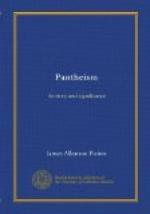[Sidenote: Spinoza no Materialist,]
[Sidenote: Notwithstanding his Attribution of “Extension” to God.]
[Sidenote: Criticism by Sir F. Pollock.]
[Sidenote: Changes In Theories of Matter since Spinoza’s time.]
Spinoza’s maintenance of extension as one of the two infinite divine attributes cognizable by us has, with a certain amount of plausibility, been urged as a note of materialism. And this reproach has been supported by reference to his insistence that in man the body and the soul are only two different aspects of the same thing; for to him the body is a finite Mode of God’s infinite attribute of extension and the soul a finite Mode of God’s infinite attribute of thought, while both are manifestations of the one eternal divine Substance. Still, if in any way we are to regard God as extended, it seems impossible to avoid the inference that we regard Him as identified with matter, or at least the possibility of matter. Sir Frederick Pollock has admitted that this is a weak point in Spinoza’s philosophy,[16] and mars its symmetry. But, being more concerned with, his religion, I am content to point out that such an objection was much more effective in Spinoza’s time than it is to-day. For the whole trend of philosophy during the nineteenth century was towards a view of Extension itself as a mode of Thought, and therefore toward the absorption of one of Spinoza’s theoretical divine attributes in the other.
[Sidenote: Their Effect on his System.]
Now if this should prove to be the permanent tendency of the most influential thinkers—as indeed seems most likely—it will probably be held that Spinoza was wrong in attributing extension to the Eternal as one of the qualities of His substance, except in so far as extension is, if not a necessary, at any rate an actual, and so far as we know, a universal mode of thought. But though, as Sir Frederick Pollock has pointed out, Spinoza has in a manner “counted thought twice over” while treating of the only two infinite attributes cognizable to us, we need not, on that account, surrender his luminous idea of God as a Being absolutely infinite, that is, “Substance consisting of infinite Attributes, whereof each one




